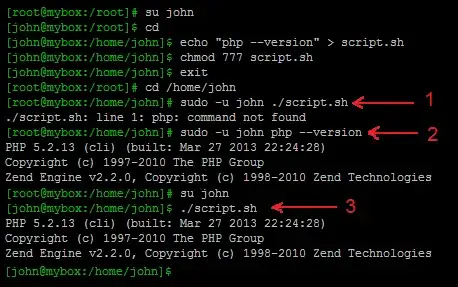I have this weird problem. The php command is not found in one specific sitiation.
I try to call the command in three different ways. Only one of them fails:

Being user
johnI create a simple script which callsphp --version. Then as userrootI call that script like this:sudo -u john ./script.sh
This way thephpcommand is not found.Being
rootI invoke the command directly like this:sudo -u john php --version
No problem here, the command does exist.I call the script directly as user 'john':
./script.sh
It works fine too.
What is causing this?
The problem happens with other users too, not just john, and it happens on this particular machine only.
The OS is CentOS 5.9.
EDIT: Also, other commands like gcc, perl or python don't present this problem. The php command is the only one I found so far with the problem.